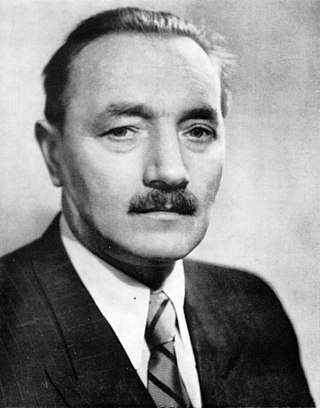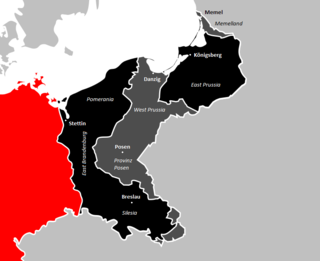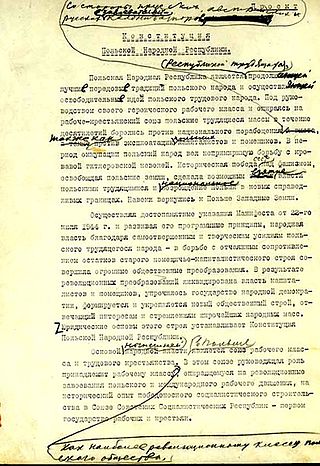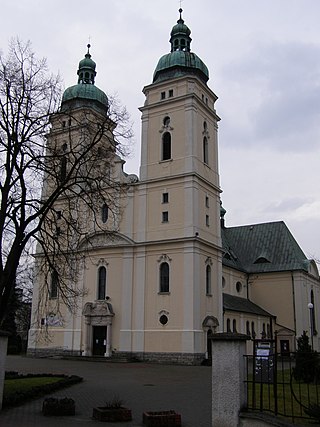
The president of Poland, officially the president of the Republic of Poland, is the head of state of the Republic of Poland. Their rights and obligations are determined in the Constitution of Poland. The president heads the executive branch. In addition, the president has the right to dissolve parliament in certain cases, can veto legislation, represents Poland in the international arena, and is the commander-in-chief.

Bolesław Bierut was a Polish communist activist and politician, leader of communist-ruled Poland from 1947 until 1956. He was President of the State National Council from 1944 to 1947, President of Poland from 1947 to 1952, General Secretary of the Central Committee of the Polish United Workers' Party from 1948 to 1956, and Prime Minister of Poland from 1952 to 1954. Bierut was a self-educated person. He implemented aspects of the Stalinist system in Poland. Together with Władysław Gomułka, his main rival, Bierut is chiefly responsible for the historic changes that Poland underwent in the aftermath of World War II. Unlike any of his communist successors, Bierut led Poland until his death.

Magdeburg rights were a set of town privileges first developed by Otto I, Holy Roman Emperor (936–973) and based on the Flemish Law, which regulated the degree of internal autonomy within cities and villages granted by the local ruler. Named after the German city of Magdeburg, these town charters were perhaps the most important set of medieval laws in Central Europe. They became the basis for the German town laws developed during many centuries in the Holy Roman Empire. The Magdeburg rights were adopted and adapted by numerous monarchs, including the rulers of Bohemia, Hungary, Poland and Lithuania, a milestone in the urbanization of the region which prompted the development of thousands of villages and cities.

The Polish Workers' Party was a communist party in Poland from 1942 to 1948. It was founded as a reconstitution of the Communist Party of Poland (KPP) and merged with the Polish Socialist Party (PPS) in 1948 to form the Polish United Workers' Party (PZPR). From the end of World War II the PPR led Poland, with the Soviet Union exercising moderate influence. During the PPR years, the centers of opposition activity were largely diminished, and a socialist system was established in the country.

The Free City of Danzig was a city-state under the protection and oversight of the League of Nations between 1920 and 1939, consisting of the Baltic Sea port of Danzig and nearly 200 other small localities in the surrounding areas. The polity was created on 15 November 1920 in accordance with the terms of Article 100 of the 1919 Treaty of Versailles after the end of World War I.

Elisabeth Becker was a Nazi concentration camp overseer in World War II. She was convicted at the Stutthof trials of crimes against humanity and executed.

The former eastern territories of Germany refer in present-day Germany to those territories east of the current eastern border of Germany, i.e., the Oder–Neisse line, which historically had been considered German and which were annexed by Poland and the Soviet Union after World War II in Europe. In most of these territories, Germans used to be the dominant or sole ethnicity. In contrast to the lands awarded to the restored Polish state by the Treaty of Versailles after World War I, the German territories lost with the Potsdam Agreement after World War II in Europe on 2 August 1945 were either almost exclusively inhabited by Germans before 1945, mixed German–Polish with a German majority, or mixed German–Czech with a German majority (Glatz). Virtually the entire German population of the territories that did not flee voluntarily in the face of the Red Army advance of 1945, was violently expelled to Germany, with their possessions being looted and stolen.

Belweder is a neoclassical palace in Warsaw, Poland. Erected in 1660 and remodelled in the early 1800s, it is one of several official residences used by Polish presidents as well as a state guest house for visiting heads of state. The complex is situated south of Warsaw's city center, in the vicinity of the historic Royal Baths Park (Łazienki).

Krajowa Rada Narodowa in Polish was a parliament-like political body created during the later stages of World War II in German-occupied Warsaw, Poland. It was intended as a communist-controlled center of authority, challenging organs of the Polish Underground State. The existence of the KRN was later accepted by the Soviet Union and the council became to a large extent subjugated and controlled by the Soviets.

Medal of Victory and Freedom 1945 was a Polish military decoration awarded to persons who fought during World War II against Nazi Germany.

The Constitution of the Polish People's Republic was a supreme law passed in communist-ruled Poland on 22 July 1952. It superseded the post-World War II provisional Small Constitution of 1947, which in turn replaced the pre-war April Constitution of 1935.
Anti-Jewish violence in Poland from 1944 to 1946 preceded and followed the end of World War II in Europe and influenced the postwar history of the Jews and Polish-Jewish relations. It occurred amid a period of violence and anarchy across the country caused by lawlessness and anti-communist resistance against the Soviet-backed communist takeover of Poland. The estimated number of Jewish victims varies, ranging up to 2,000. In 2021, Julian Kwiek published the first scientific register of incidents and victims of anti-Jewish violence in Poland from 1944 to 1947; according to Kwiek's calculations, the number of victims was 1,074 to 1,121. Jews constituted between two and three percent of the total number of victims of postwar violence in the country, including Polish Jews who managed to escape the Holocaust in territories of Poland annexed by the Soviet Union, and returned after the border changes imposed by the Allies at the Yalta Conference. Incidents ranged from individual attacks to pogroms.
The Supreme National Tribunal was a war-crime tribunal active in communist-era Poland from 1946 to 1948. Its aims and purpose were defined by the State National Council in decrees of 22 January and 17 October 1946 and 11 April 1947. The new law was based on an earlier decree of 31 August 1944 issued by the new Soviet-imposed Polish regime, with jurisdiction over "fascist-Hitlerite criminals and traitors to the Polish nation". The Tribunal presided over seven high-profile cases involving a total of 49 individuals.

The Territorial Prelature of Schneidemühl or Territorial Prelature of Piła was a Roman Catholic territorial prelature in first Germany and then Poland. It covered the territory of the Prussian Province of the Frontier March of Posen-West Prussia, but also the territories of the Lauenburg and Bütow Land and the former Starostwo of Draheim (Drahim), which were parts of the Province of Pomerania at the time. It was named after its seat in Schneidemühl (Piła) and belonged to the Eastern German Ecclesiastical Province under the Breslau/Wrocław Metropolia since 1930.
Bierut Decree or Warsaw Land Decree is a common name of the Decree on Ownership and Usufruct of Land in the Area of the Capital of Warsaw also translated as the Decree on Ownership and Use of Land in Warsaw issued in Poland on 26 October 1945 by the State National Council. The Decree, named after the council's leader, Bolesław Bierut, nationalized most of the land properties in Warsaw.
After the end of World War II, the Communist government in Poland instituted large scale nationalizations in Poland starting in 1944.
Polish law allows modern firearms ownership on a general shall-issue basis under police-issued permit for people who provide an important reason. Hunting, sport shooting, training and collecting are the most popular reasons and require membership in suitable organizations. Self-defense permits for civilians are chief exceptions to the rule, where a may-issue based permit is required. Antique black powder firearms or their replicas and most air guns are available without a permit. Firearm owners are subject to mental health and domestic violence confiscation laws resembling U.S red flag laws.

The Medal for Warsaw 1939–1945 was a Polish commemorative medal awarded by the Polish People's Republic to commemorate active participation in defending Warsaw in 1939, 1944 Warsaw Uprising, and in liberation of Warsaw from Nazi Germany in January 1945.

The Gdańsk Voivodeship was a voivodeship (province) with capital in Gdańsk, that was located in the region of Pomerelia. It existed from 1945 to 1975. Until 28 June 1945, it remained under the administration of the Provisional Government of the Republic of Poland, which then was replaced by the Provisional Government of National Unity. On, 19 February 1947, the provisional government was replaced by the Polish People's Republic. It was established on 7 April 1945, from the parts of the territories of the Pomeranian Voivodeship, and the Masurian District, Poland. The voivodeship ceased to exist on 31 May 1975, when it was partitioned by then-established voivodeships of Elbląg, Gdańsk, and Słupsk.













